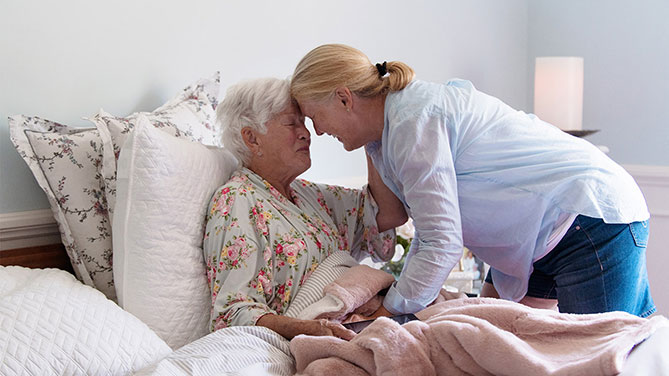Watching the one you love slip away from you, bit by bit, day by day, can be the hardest time of your life. But there are ways to help your loved one, yourself and your family to ease the pain and let some light and love and laughter slip in. Here are our five tips to help those dealing with family members who are in their final days.
Family Interchange
Clear communications between your loved one, you and the rest of the family are essential. A person, facing the final few months of his or her life, has preferences and hopes that need to be conveyed to you and the family. If possible, a conversation with everyone present would be best. A careful summary of the conversation should be put in writing and given to all members of the family. Be sure to start talking early. The sooner you bring up the subject of end of life care and find out what your loved one feels and wants, the better.
Talk Openly About Death
Don’t beat around the bush. Be clear. Your loved one wants to communicate. He or she wants to talk about what is happening. You need to facilitate this and accept the facts. It’s okay to cry, to show emotions. In fact, it would not be a good idea to be stoic and repress your emotions. That special person craves the reassurance that you feel love and loss, the reassurance that your tears can bring.
Paperwork
There are several important documents that need to be considered:
- The will – While your loved one is coherent and capable of making decisions, get a legal will drawn up. Eliminate the confusion and problems that would follow a death without a will.
A living will – This is a record of your loved one’s wishes regarding end of life care. Making these choices early will prevent a lot of anger, frustration and heartache at the end. - Durable medical power of attorney – This is a legal document, which like the will, should be drawn up by a lawyer. It designates one person to make the decisions regarding the medical and/or surgical care of your loved one, once he or she is no longer capable of making rational decisions. The choice of the individual should be considered carefully. You should try to view this rationally, realizing that you may not be the best choice for this responsibility.
- Durable financial power of attorney – Another legal document that requires a lawyer’s assistance, this one assigns the decisions for finances, property, etc. to one person. who will be responsible once coherent decisions are no longer possible.
- Do Not Resuscitate and/or Do Not Intubate orders – These are extremely helpful to any physician in an emergency room who does not know the patient. They provide clear direction to the medical team as they care for your loved one in their final days.
Create a Team
You cannot do this by yourself. You need backup. Involve your family. Bring in the family doctor and perhaps a specialist who showed special concern. And bring in hospice care. Hospice will provide medical, emotional and physical support for the patient and for you and your family. The nurses and doctors and aides will be pillars you can lean on when you’re close to collapse. They will be able to provide answers to many of your questions, help obtain durable medical equipment and supplies, and enable you to keep your loved one at home, the most comfortable, best loved place.
Give Your Time
Loneliness and boredom will be two of the worst problems your loved one will face. Spend as much time as you can with him or her. You will never regret it. And the memories will help when that special person is gone. Your time is the greatest gift you can give. Encourage the rest of the family to visit with your loved one regularly. Even short visits are valuable. Reassure young people in your family that they will be welcomed and that their visits will be especially valuable and meaningful to your loved one.
You are facing a time of trial and pain, but you can help your loved one by spending time together laughing and enjoying life for a little longer.
healthline.com




